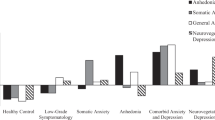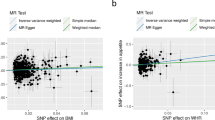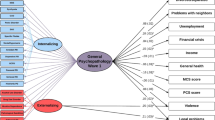Abstract
Objectives:
(1) To investigate whether there is an association between obesity and mental disorders in the general populations of diverse countries, and (2) to establish whether demographic variables (sex, age, education) moderate any associations observed.
Design:
Thirteen cross-sectional, general population surveys conducted as part of the World Mental Health Surveys initiative.
Subjects:
Household residing adults, 18 years and over (n=62 277).
Measurements:
DSM-IV mental disorders (anxiety disorders, depressive disorders, alcohol use disorders) were assessed with the Composite International Diagnostic Interview (CIDI 3.0), a fully structured diagnostic interview. Obesity was defined as a body mass index (BMI) of 30 kg/m2 or greater; severe obesity as BMI 35+. Persons with BMI less than 18.5 were excluded from analysis. Height and weight were self-reported.
Results:
Statistically significant, albeit modest associations (odds ratios generally in the range of 1.2–1.5) were observed between obesity and depressive disorders, and between obesity and anxiety disorders, in pooled data across countries. These associations were concentrated among those with severe obesity, and among females. Age and education had variable effects across depressive and anxiety disorders.
Conclusions:
The findings are suggestive of a modest relationship between obesity (particularly severe obesity) and emotional disorders among women in the general population. The study is limited by the self-report of BMI and cannot clarify the direction or nature of the relationship observed, but it may indicate a need for a research and clinical focus on the psychological heterogeneity of the obese population.
This is a preview of subscription content, access via your institution
Access options
Subscribe to this journal
Receive 12 print issues and online access
$259.00 per year
only $21.58 per issue
Buy this article
- Purchase on Springer Link
- Instant access to full article PDF
Prices may be subject to local taxes which are calculated during checkout
Similar content being viewed by others
References
Kim S, Popkin BM . Commentary: understanding the epidemiology of overweight and obesity–a real global public health concern. Int J Epidemiol 2006; 35: 60–67.
Kopelman PG . Obesity as a medical problem. Nature 2000; 404: 635–643.
Olshansky SJ, Passaro DJ, Hershow MD, Layden J, Carnes BA, Brody J et al. A potential decline in life expectancy in the United States in the 21st century. N Engl J Med 2005; 352: 1138–1144.
Friedman MA, Brownell KD . Psychological correlates of obesity: moving to the next research generation. Psychol Bull 1995; 117: 3–20.
Onyike CU, Crum RM, Lee HB, Lyketsos CG, Eaton WW . Is obesity associated with major depression? Results from the Third National Health and Nutrition Examination Survey. Am J Epidemiol 2003; 158: 1139–1147.
Stunkard A, Faith MS, Allison KC . Depression and obesity. Biol Psychiatry 2003; 54: 330–337.
Faith MS, Matz PE, Jorge MA . Obesity–depression associations in the population. J Psychosom Res 2002; 53: 935–942.
Carpenter KM, Hasin DS, Allison DB, Faith MS . Relationships between obesity and DSM-IV major depressive disorder, suicide ideation, and suicide attempts: results from a general population study. Am J Public Health 2000; 90: 251–257.
Simon GE, Von Korff M, Saunders K, Miglioretti DL, Crane PK, van Belle G et al. Association between obesity and psychiatric disorders in the US adult population. Arch Gen Psychiatry 2006; 63: 1–7.
Scott KM, Oakley Browne MA, McGee MA, Wells JE . Mental-physical comorbidity in Te Rau Hinengaro: the New Zealand Mental Health Survey (NZMHS). Aust N Z J Psychiatry 2006; 40: 882–888.
Popkin BM . The nutrition transition and its health implications in lower-income countries. Public Health Nutr 1998; 1: 5–21.
WHO. Obesity: Preventing and Managing the Global Epidemic, in World Health Organisation Technical Report Series: 894 2000.
Demyttenaere K, Bruffaerts R, Posada-Villa J, Gasquet I, Kovess V, Lepine JP et al. Prevalence, severity, and unmet need for treatment of mental disorders in the World Health Organization World Mental Health Surveys. JAMA 2004; 291: 2581–2590.
Sobal J, Stunkard A . Socioeconomic status and obesity: a review of the literature. Psychol Bull 1989; 105: 260–275.
Orbach S . Commentary: there is a public health crisis—its not fat on the body but fat in the mind and the fat of profits. Int J Epidemiol 2006; 35: 67–69.
Kessler RC, Bergland P, Chiu WT, Demler O, Heeringa S, Hiripi E et al. The US National Comorbidity Survey Replication (NCS-R): design and field procedures. Int J Methods Psychiatr Res 2004; 13: 69–92.
Kessler RC, Ustun TB . The World Mental Health (WMH) Survey Initiative Version of the World Health Organisation (WHO) Composite International Diagnostic Interview (CIDI). Int J Methods Psychiatr Res 2004; 13: 93–121.
APA. DSM-IV: Diagnostic and Statistical Manual of Mental Disorders, 4th edn. American Psychiatric Association: Washington, DC, 1994.
Haro JM, Arbabzadeh-Bouchez S, Brugha TS, de Girolamo G, Guyer ME, Jin R et al. Concordance of the Composite International Diagnostic Interview Version 3.0 (CIDI 3.0) with standardized clinical assessments in the WHO World Mental Health Surveys. Int J Methods Psychiatr Res 2006; 15: 167–180.
Niedhammer I, Bugel I, Bonenfant S, Goldberg M, Leclerc A . Validity of self-reported weight and height in the French GAZEL cohort. Int J Obes Relat Metab Disord 2000; 24: 1111–1118.
Weaver TW, Kushi LH, McGovern PG, Potter JD, Rich SS, King RA . Validation of self-reported measures of fat distribution. Int J Obes Relat Metab Disord 1996; 20: 644–650.
Yun S, Zhu BP, Black W, Brownson RC . A comparison of national estimates of obesity prevalence from the behavioural risk factor surveillance system and the National Health and Nutrition Examination Survey. Int J Obes 2006; 30: 164–170.
Ministry of Health: A Portrait of Health. Key results of the 2002/03 New Zealand Health Survey. Ministry of Health: Wellington, 2004.
Wolter KM . Introduction to Variance Estimation. Springer-Verlag: New York, 1985.
SUDAAN. Version 8.0.1. Research Triangle Institute: Research Triangle Park: NC, 2002.
DerSimonian R, Laird N . Meta-analysis in clinical trials. Control Clin Trials 1986; 7: 177–188.
Linde JA, Jeffery RW, Levy RL, Sherwood NE, Utter J, Pronk NP . Binge eating disorder, weight control self-efficacy, and depression in overweight men and women. Int J Obes 2004; 28: 418–425.
Brownell KD . Dieting and the search for the perfect body: where physiology and culture collide. Behav Ther 1991; 22: 1–12.
Chen EY, Brown M . Obesity stigma in sexual relationships. Obes Res 2005; 13: 1393–1397.
Striegel-Moore RH, Silberstein LR, Rodin J . Toward an understanding of risk factors for bulimia. Am Psychol 1986; 41: 246–263.
Striegel-Moore RH . Etiology of binge eating: a developmental perspective. In: Fairburn CG, Wilson GT (eds). Binge Eating: Nature, Assessment and Treatment. Guilford Press: New York, 1993. pp 144–172.
Smolak L, Striegel Moore RH . Gender and eating problems. In: Striegel-Moore RH, Smolak L (eds). Eating Disorders: Innovative Directions in Research and Practice. American Psychological Association: Washington, DC, 2002.
Polivy J, Herman CP . Dieting and binging: a causal analysis. Am Psychol 1985; 40: 193–201.
Blair AJ, Lewis VJ, Booth DA . Does emotional eating interfere with success in attempts at weight control? Appetite 1990; 15: 151–157.
Marcus M . Binge eating and obesity. In: Brownell KD, Fairburn CG (eds). Eating Disorders and Obesity: A Comprehensive Handbook. Guilford Press: New York, 1995. pp 441–444.
Wadden TA, Brownell KD, Foster GD . Obesity: responding to the global epidemic. J Consult Clin Psychol 2002; 70: 510–525.
Puhl RM, Brownell KD . Psychosocial origins of obesity stigma: toward changing a powerful and pervasive bias. Obes Rev 2003; 4: 213–227.
Lidstone JS, Ells LJ, Finn P, Whittaker VJ, Wilkinson JR, Summerbell CD . Independent associations between weight status and disability in adults: results from the Health Survey for England. Public Health 2006; 120: 412–417.
Houston DK, Stevens J, Cai J . Abdominal fat distribution and functional limitations and disability in a biracial cohort: the Atherosclerosis Risk in Communities Study. Int J Obes 2005; 29: 1457–1463.
McGuire MT, Wing RR, Klem ML, Lang W . What predicts weight regain in a group of successful weight losers? J Consult Clin Psychol 1999; 67: 177–185.
Schwartz TL, Nihalani N, Jindal S, Virk S, Jones N . Psychiatric medication-induced obesity: a review. Obes Rev 2004; 5: 115–121.
Hasler G, Lissek S, Ajdacic V, Milos G, Gamma A, Eich D et al. Major depression predicts an increase in long-term body weight variability in young adults. Obes Res 2005; 13: 1991–1998.
Brownell KD, Wadden TA . Etiology and treatment of obesity: understanding a serious, prevalent and refractory disorder. J Consult Clin Psychol 1992; 4: 505–517.
Foster GD, Kendall PC . The realistic treatment of obesity: changing the scales of success. Clin Psychol Rev 1994; 14: 701–736.
Acknowledgements
The surveys included in this report were carried out in conjunction with the World Health Organization World Mental Health (WMH) Survey Initiative. We thank the WMH staff for assistance with instrumentation, fieldwork and data analysis. These activities were supported by the United States National Institute of Mental Health (R01-MH070884), the John D and Catherine T MacArthur Foundation, the Pfizer Foundation, the US Public Health Service (R13-MH066849, R01-MH069864 and R01-DA016558), the Fogarty International Center (FIRCA R01-TW006481), the Pan American Health Organization, Eli Lilly and Company, Ortho-McNeil Pharmaceutical, Inc., GlaxoSmithKline and Bristol-Myers Squibb. A complete list of WMH publications can be found at http://www.hcp.med.harvard.edu/wmh/. The Mexican National Comorbidity Survey (MNCS) is supported by The National Institute of Psychiatry Ramon de la Fuente (INPRFMDIES 4280) and by the National Council on Science and Technology (CONACyT-G30544-H), with supplemental support from the PanAmerican Health Organization (PAHO). The Lebanese survey is supported by the Lebanese Ministry of Public Health, the WHO (Lebanon) and unrestricted grants from Janssen Cilag, Eli Lilly, GlaxoSmithKline, Roche, Novartis and anonymous donations. The ESEMeD project was funded by the European Commission (Contracts QLG5-1999-01042; SANCO 2004123), the Piedmont Region (Italy), Fondo de Investigación Sanitaria, Instituto de Salud Carlos III, Spain (FIS 00/0028), Ministerio de Ciencia y Tecnología, Spain (SAF 2000-158-CE), Departament de Salut, Generalitat de Catalunya, Spain and other local agencies and by an unrestricted educational grant from GlaxoSmithKline. The Colombian National Study of Mental Health (NSMH) is supported by the Ministry of Social Protection, with supplemental support from the Saldarriaga Concha Foundation. The Israel National Health Survey is funded by the Ministry of Health with support from the Israel National Institute for Health Policy and Health Services Research and the National Insurance Institute of Israel. The World Mental Health Japan (WMHJ) Survey is supported by the Grant for Research on Psychiatric and Neurological Diseases and Mental Health (H13-SHOGAI-023, H14-TOKUBETSU-026, H16-KOKORO-013) from the Japan Ministry of Health, Labour and Welfare. The New Zealand Mental Health Survey (NZMHS) is supported by the New Zealand Ministry of Health, Alcohol Advisory Council and the Health Research Council. The US National Comorbidity Survey Replication (NCS-R) is supported by the National Institute of Mental Health (NIMH; U01-MH60220) with supplemental support from the National Institute of Drug Abuse (NIDA), the Substance Abuse and Mental Health Services Administration (SAMHSA), the Robert Wood Johnson Foundation (RWJF; Grant 044708) and the John W. Alden Trust.
Author information
Authors and Affiliations
Corresponding author
Rights and permissions
About this article
Cite this article
Scott, K., Bruffaerts, R., Simon, G. et al. Obesity and mental disorders in the general population: results from the world mental health surveys. Int J Obes 32, 192–200 (2008). https://doi.org/10.1038/sj.ijo.0803701
Received:
Revised:
Accepted:
Published:
Issue Date:
DOI: https://doi.org/10.1038/sj.ijo.0803701
Keywords
This article is cited by
-
Gender differences in the associations between body mass index, depression, anxiety, and stress among endocrinologists in China
BMC Psychology (2023)
-
Excess BMI in early adolescence adversely impacts maturating functional circuits supporting high-level cognition and their structural correlates
International Journal of Obesity (2023)
-
Urinary incontinence in women who have undergone bariatric surgery
Surgical Endoscopy (2023)
-
BMI Trends for Veterans Up to 10 Years After VA Enrollment Following Military Discharge
Journal of General Internal Medicine (2023)
-
Body Mass Index and risk for onset of mood and anxiety disorders in the general population: Results from the Netherlands Mental Health Survey and Incidence Study-2 (NEMESIS-2)
BMC Psychiatry (2022)



